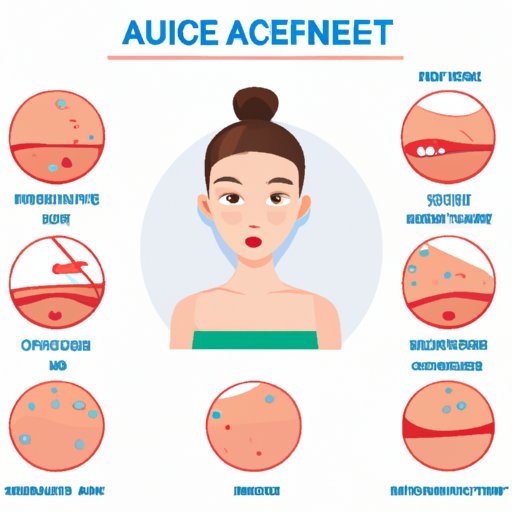
I. Introduction
Butt acne, also known as folliculitis, is a common problem for many people. This condition refers to inflammation of the hair follicles in the buttocks area that can cause red and itchy bumps, pimples, and in severe cases, cysts and scarring. Butt acne can be embarrassing and uncomfortable, but luckily, there are many causes and treatments that can effectively get rid of it.
In this article, we will discuss the causes, prevention, skincare routine, medication options, home remedies, and lifestyle changes to get rid of butt acne.
II. Causes and Prevention
Butt acne can be caused by several factors, including bacteria, oil buildup, and tight clothing. The friction and heat generated by tight and non-breathable clothing can trap sweat and bacteria, leading to clogged pores and breakouts. Additionally, poor hygiene habits, such as not showering after physical activity, can worsen the condition.
To prevent butt acne, it is essential to keep the area clean by washing with mild soap and warm water. Wearing breathable and loose-fitting clothing can help decrease friction and reduce sweat accumulation. Stressful situations can also trigger butt acne, so it’s important to practice stress-relieving techniques such as deep breathing and meditation.
III. The Role of Diet
Research shows that diet can worsen or improve acne symptoms. Consuming foods high in sugars and unhealthy fats can trigger inflammation and hormonal imbalances that can lead to acne breakouts. Therefore, it is essential to eat a well-balanced diet that includes nutrient-dense foods, such as vegetables, fruits, whole grains, and lean protein. These foods contain anti-inflammatory properties that can help reduce acne symptoms.
IV. Skincare Routine for Treating Butt Acne
A consistent skincare routine can help prevent and treat butt acne. Firstly, exfoliating the skin regularly can help remove excess oil, dead skin cells, and bacteria. It’s important to use a gentle exfoliator with finer particles because using rough grains can cause further irritation. Secondly, cleansing the skin with a body wash formulated with acne-fighting ingredients such as salicylic acid can help unclog pores and reduce inflammation. Lastly, applying spot treatments, such as benzoyl peroxide or tea tree oil, can help reduce the size and redness of acne bumps.
When choosing products, it’s important to use ones specific for body acne because they are gentler and formulated to work effectively on thicker skin. It’s also important to avoid over-washing the area, as this can disrupt the skin’s natural moisture barrier and cause irritation.
V. Medication Options
If butt acne persists, over-the-counter and prescription medication options are available. For mild to moderate acne, benzoyl peroxide or salicylic acid-containing products can be used. These products help kill bacteria and unclog pores. Additionally, topical or oral antibiotics are effective for treating moderate to severe acne. For severe cases, isotretinoin, a strong oral medication, can treat severe or cystic acne.
It’s important to speak to a healthcare professional before trying any medication options, as they may have potential side effects or interact with other medications.
VI. Home Remedies for Butt Acne
For many people, home remedies using natural ingredients can help reduce butt acne symptoms without harsh chemicals or medications. Aloe vera gel can soothe irritated skin and reduce inflammation. Tea tree oil, a natural antibacterial agent, can help kill bacteria and prevent further breakouts. Apple cider vinegar can be used as a natural toner because of its exfoliating and antimicrobial properties. However, it’s important to patch test before using any home remedies to avoid an allergic reaction, and it’s recommended to consult a healthcare professional before use.
VI. Lifestyle Changes
In addition to skincare and medication options, making certain lifestyle changes can also help prevent and treat butt acne. It’s essential to wear loose-fitting clothing made from breathable materials that allow air to circulate. When participating in physical activity or sweating, taking a shower or bath immediately afterward can help remove sweat that can contribute to clogged pores. Additionally, practicing stress-reducing techniques such as meditation and deep breathing can help reduce stress and prevent flare-ups.
VIII. Conclusion
Butt acne can be a frustrating and uncomfortable condition, but it is treatable. A consistent skincare routine, medication options, home remedies, and lifestyle changes can help reduce and prevent the occurrence of butt acne. It’s important to consult a healthcare professional before trying any new treatments, as they can recommend safe and effective options. By incorporating these recommendations into daily life, butt acne can be managed, and clear, healthy-looking skin can be achieved.




